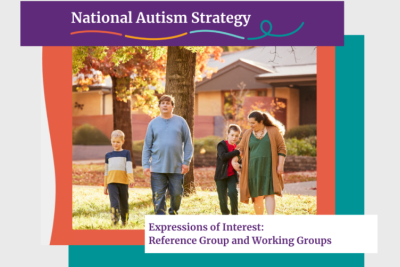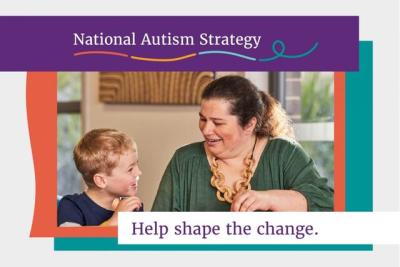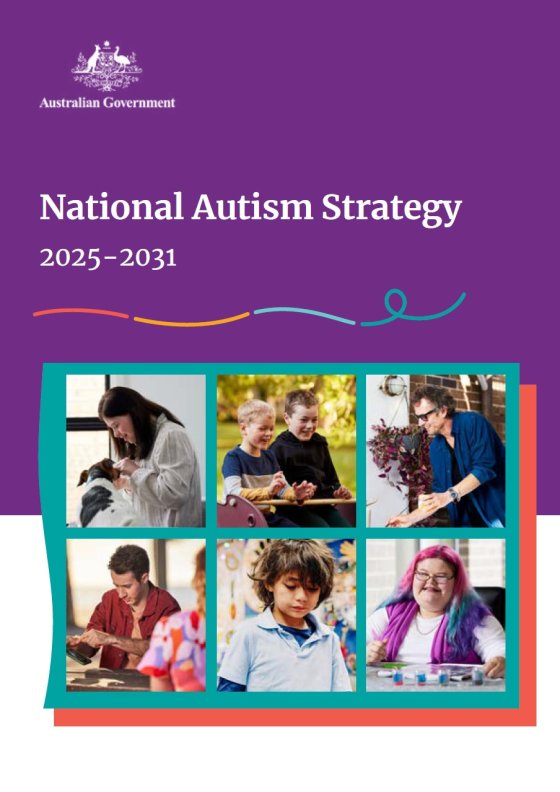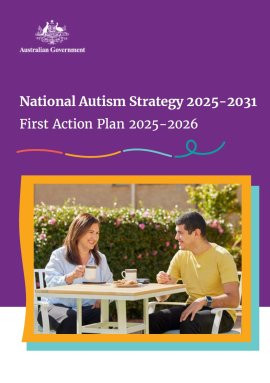About the National Autism Strategy
The National Autism Strategy has been developed through a comprehensive co-design process. The strategy sets out the vision for a safe and inclusive society for all Autistic people. One where we support and empower Autistic people to thrive, in all aspects of life. This is in line with international human rights.
The strategy is a framework for improving outcomes for all Autistic people in the years ahead. It includes a vision, goal and guiding principles.
The strategy focuses on actions and enabling change in 4 key outcome areas:
- social inclusion
- economic inclusion
- diagnosis, services and supports
- health and mental health via the National Roadmap to Improve the Health and Mental Health of Autistic People(Opens external website) (the Autism Health Roadmap).
Each outcome area covers a broad range of issues. The strategy includes commitments under the first 3 outcome areas. The Autism Health Roadmap will address the fourth key outcome area, to improve health and mental health. The Department of Health and Aged Care leads the development of the Autism Health Roadmap. This is through a separate process, connected to the strategy.
National Autism Strategy 2025-2031
National Autism Strategy First Action Plan
The Strategy will be supported by the National Autism Strategy First Action Plan 2025-26 (Action Plan). The Action Plan builds on what we heard through the national consultation process and the work of the National Autism Strategy Oversight Council and supporting Working Groups. This information will also be drawn on over the coming years as further actions are identified and implemented.
The Action Plan includes details of tangible actions that will support achieving the key outcomes in the Strategy.
National Autism Strategy First Action Plan 2025-2026
Access thisNational Autism Strategy Oversight Council
An expert National Autism Strategy Oversight Council was established to provide advice to Government to informon the development of the Strategy. The Council council was co-chaired by Mrs Clare Gibellini – Autistic and autism Community member and Mr Luke Mansfield – Department of Social Services.
How to talk about autism
We acknowledge that people use different words to talk about autism, and that each person will have a way of talking about autism and themselves that they like best. Some people in the Autistic community like to say ‘Autistic person’ (identity first language), some like to say ‘person with Autism’ (person first language), and some are fine with using either.
We use identity first language to talk about the National Autism Strategy. This means we will be using the term Autistic person or Autistic people.
Subscribe for updates
Sign up for updates on the development of the National Autism Strategy.
Updates
Find updates about the National Autism Strategy.
National Autism Strategy Working Groups appointed
Oversight Council announced
Additional funding committed for National Autism Strategy
News
Find news articles about the National Autism Strategy.
National Autism Strategy Reference Group and working groups

Release of the National Autism Strategy 2025-31

Have your say on the draft National Autism Strategy

Australian Government response to the Senate Select Committee on Autism

National Autism Strategy


